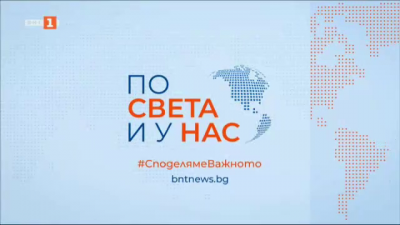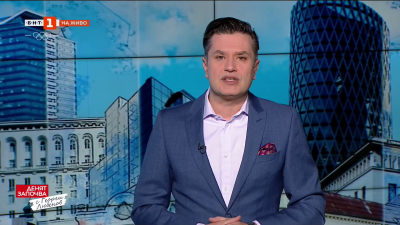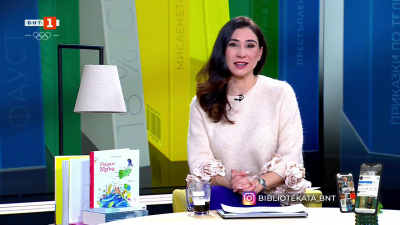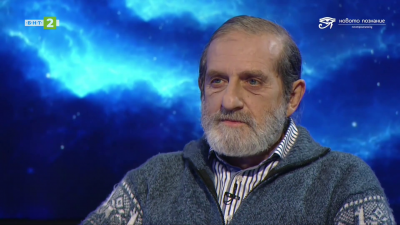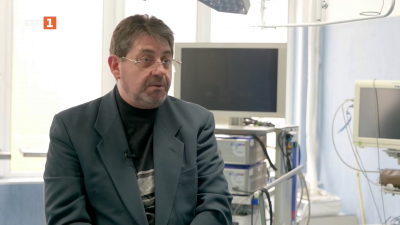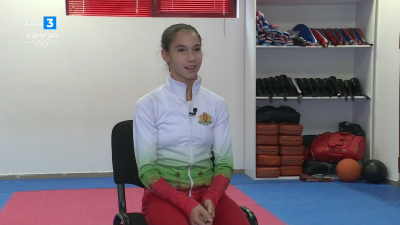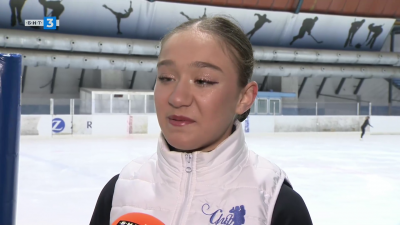Bulgaria is heading towards yet another snap election – what we need to know
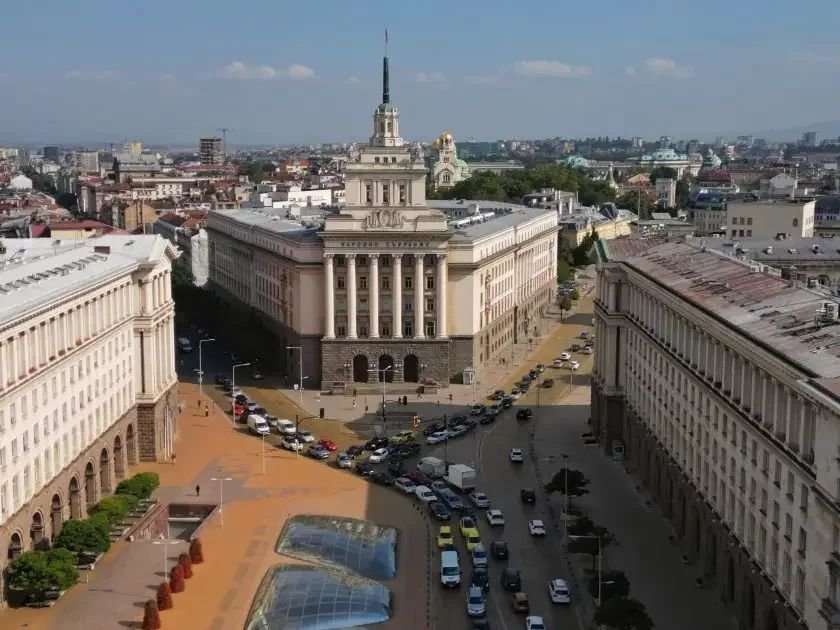
BNT archive
The month-long pre-election campaign for the early parliamentary election in Bulgaria officially began at midnight on September 27. These will be the seventh early elections since 2021.
Bulgarians went to the polls to elect members of the 240 seat national Parliament three times in 2021, once in 2022 and once in 2023. The upcoming October 27 vote will be the second one in 2024. Only two of the previous parliamentary elections in the past three years have produced an elected government, neither of which came close to serving a full term.
A total of 19 parties and 9 coalitions have registered to participate in the elections and will try to enter the 51st National Assembly. In order to do so, a formation should pass the 4% threshold to secure representation in Parliament.
According to a poll conducted between September 18 and 24, 2024 by Alpha Research polling agency, a Parliament consisting of seven groups is possible after Bulgaria’s October 27 2024 early parliamentary elections.
On the eve of the official start of the election campaign, Boyko Borisov’s Citizens for European Development of Bulgaria (GERB) is seen as getting the largest share of support among those who intend to vote, at 23.9%, Alpha Research said.
In second place is ‘We Continue the Change-Democratic Bulgaria’ (WCC-DB) coalition, 14.4%, followed closely by nationalist party Vazrazhdane, 14.2%. Movement for Rights and Freedoms (MRF) founder Ahmed Dogan’s Alliance for Rights and Freedoms (ARF) coalition gets 7.9 %; the Bulgarian Socialist Party 6.3%; Delyan Peevski’s Movement for Rights and Freedoms-New Beginning coalition 6.1%; and cable television presenter Slavi Trifonov’s populist ‘There is Such a People’ (ITN) party 5.4%.
Just below the 4% threshold for a share of seats in the 51st National Assembly is nationalist-populist party Velichie, at 3.2%.
The Alpha Research poll found that among those who intend voting, 8% were undecided.
About 30-31 % of Bulgarians who have the right to vote are ready to do so in the early elections in October, which is a drop of about three percentage points compared with the June 2024 elections. About 61.6 percent of adult citizens surveyed by Alpha Research define the current situation as “extremely worrying, with destabilization and non-functioning institutions”. Against this background, 53.8 percent of Bulgarians no longer expect a government to be formed even after the elections on October 27. 40% think that there will be a cabinet. The parties do not give voters any reason to believe that after October 27 snap elections, they will sit at the negotiating table to form a government. These are factors that discourage people’s participation in the elections. Nearly 52% of respondents think it is best if a broad coalition is formed. 43% would prefer a coalition around one leading political force. Pollsters expect a colourful, fragmented Parliament consisting of 7 to 9 parties. If the trend of low turnout persists, this means a lower number of votes will be needed to pass the 4% electoral threshold - something also observed in June and an opportunity for different parties, especially those with some form of protest vote, to pass this threshold.
Boryana Dimitrova, from Alpha Research polling agency, commented for BNT on why Bulgaria is heading for the seventh early parliamentary elections in three years. The last regular elections in Bulgaria were held in 2021, and at the end of 2024 we had a year and three months of regular cabinets, and for practically three years we have been governed by caretaker governments, and if the short answer is because we can't elect a regular government, the question why arises, Dimitrova responded. There could be many reasons, Dimitrova said, but in short, because there's sharp confrontation, antagonism in Parliament and impossibility to form coalitions in two main aspects. One is - parties that are pro the status quo against pro-reform parties. The other one is pro-European against anti-European parties. These is no overlapping between the two, Dimitrova explained.
We have a party that are anti the status quo, the reformist ‘We Continue the Change - Democratic Bulgaria’ coalition, which is pro-European and against the status quo, embodied by GERB, which governed Bulgaria for 11 years, before 2021, when the protests began. There are other parties that are against GERB and the status quo but are outright pro-Russian parties, anti-West parties. So, these two key divisions in Bulgarian politics – against the status quo, pro-reformist, pro-West and anti-west parties - there is sharp polarization, no connecting lines can be drawn between them and because no majority can be gathered around any of these groups, Bulgaria cannot elect a regular government. Over these three years, there were different winners in the elections. GERB, There is Such a People and We Continue the Change-Dmemocratic Bulgaria each won elections, but were not able to form a government, or at least a long-lasting one. This happened because between the parties there are not enough common lines, common points, there’s no common programme around which a governing coalition could be formed. There are deep divisions and because of them, there is lack of specific governing priorities which would allow the formation of a possible government, Dimitrova added.
If the parliamentary elections were to be held today, seven political formations are certain to enter the National Assembly, with two more with a chance of passing the 4% electoral threshold, indicates a poll by Trend agency.
Between 2 and 2.2 million Bulgarians are expected to cast their votes in the October 27 snap parliamentary elections. According to Trend's survey, GERB maintains its lead with 24.8 percent.
The second place is still contested, with Vazrazhdane gaining 15.6 percent support from decided voters, placing it second, followed by We Continue the Change - Democratic Bulgaria with 15.1 percent and Alliance for Rights and Freedoms with 8.5 percent.
The Bulgarian Socialist Party and There Is Such a People would receive 6.9 percent each. The Movement for Rights and Freedoms - New Beginning coalition enjoys the support of 5.8 percent of decided voters.
The poll shows that 3.9 percent of respondents would choose the “I do not support anyone” option, with this percentage being distributed among all political entities.
Two-thirds of eligible voters agreed with the notion that parties should find the compromises needed to form a regular government after the elections, while 19 percent were of the opinion that if these compromises are too big, it would be better to hold elections again.
Parvan Simeonov from Gallup International Balkan polling agency, told BNT that everywhere in the western world the liberals are losing their ground, and here in Bulgaria the liberal progressive formations do not have a solid social base, and are not able to change it. Bulgaria has been on hold for four years already. Change is difficult, there’s mistrust in the whole political system which gives good ground for Russian propaganda, Simeonov added. At least, three parties will be needed for the formation of the next government, and when we count them in terms of seats in Parliament, we can see that it will not be easy, Simeonov believes. Commenting on the Trend poll results, which found that the nationalist Vazrazhdane party gets more votes than WCC-DB coalition, he said that if a radical formation comes in second place, this could, in turn, be an additional binder to make some kind of government.
Electoral attitude at the start of the election campaign (among those who have decided to vote):
(Alpha Research polling agency)
GERB 23.9%
We Continue the Change – Democratic Bulgaria 14.4%
Vazrazhdane 14.2%
Alliance for Rights and Freedoms 7.9%
BSP 6.3%
MRF - New Beginning 6.1%
There is Such a People 5.4%
Velichie 3.2%
MECH 2.8%
Blue Bulgaria 2.6%
Others 5.2%
Undecided 8%
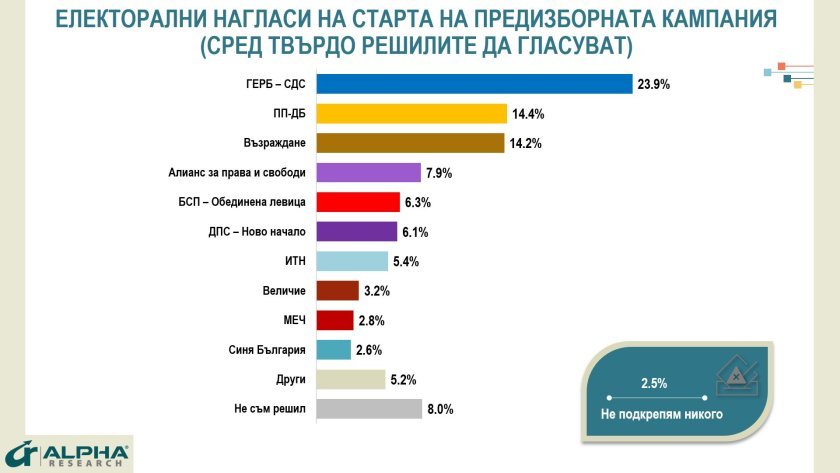
Boryana Dimitrova, Alpha Research: “These two key divisions in Bulgarian politics are pro-status quo and pro-reform, pro-Western and anti-Western parties, we have a very sharp polarization. No connecting lines can be drawn between them and due to the fact that no majority can be gathered around any of these groups, Bulgaria struggles to form a regular government."
Boryana Dimitrova, Alpha Research: “There are not enough common points between the Bulgarian parties, a common programme, that parties can say, we can form a coalition for governance around these common points. There are deep dividing lines. And with these deep dividing lines, there is a lack of concrete governance priorities that can give an opportunity for governance."
Boryana Dimitrova, Alpha Research: “The party egotism of some of the parties, which seem to be waiting for the right moment to form a strong majority, they want to dictate the situation and then form a government. However, let us say that there are two factors that stand on the side, but seem to set signals to our politicians. There is a constant question about what is happening between Russia and Ukraine. What's going to happen with the elections in the United States of America? Each of the parties has its geopolitical and political partnerships, so inevitably these considerations come into play. Let us hope that Bulgaria will elect a regular government this time. But the more the Parliament is fragmented, the more difficult it becomes to form a government."
Electoral attitudes before the parliamentary elections:
(Trend polling agency)
GERB 24.8%
Vazrazhdane 15.6%
We Continue the Change-Democratic Bulgaria 15.1%
Alliance for Rights and Freedoms 8.5%
BSP 6.9%
There is Such a People 6.9%
MRF - New Beginning 5.8%
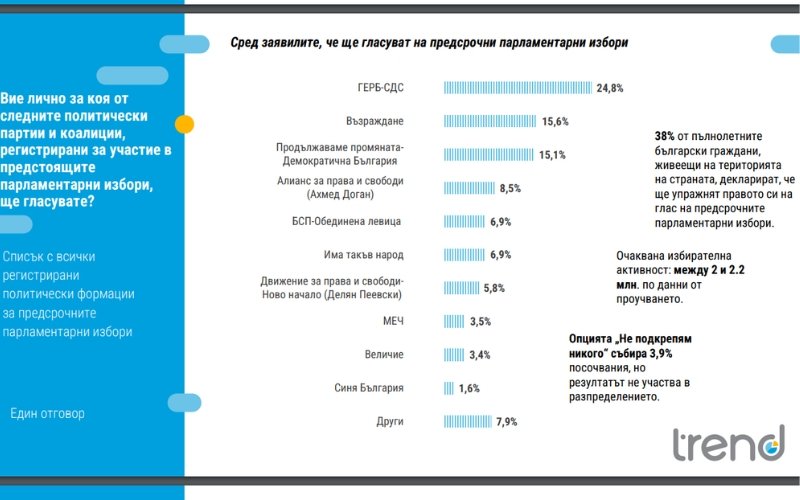
Parvan Simeonov, Gallup International: “Change is becoming very difficult, and let us not forget that in such an ageing society, with very serious social inequalities, there is a very serious, permanent distrust of the whole system, which is expressed in the constant entry of new, radical and populist players. This is extremely fertile ground, together with the historical peculiarities of the Bulgarian case, this is very good ground for foreign propaganda, for Russian propaganda, and you see how complicated and unsolvable a knot is that on the one hand the cosmopolitan, liberal forces in Bulgaria do not have a very solid social base. The pragmatic forces, the conservative forces, have a very strong social base, and the radicals and the pro-Eastern elements are gaining their social base very quickly. It is very difficult to achieve a sustainable coalition format in this node because they differ dramatically on all of these."
Parvan Simeonov, Gallup International: “The global crisis of the liberal, or the Western crisis of the liberal, everywhere in our Western world right now there is a clash between traditionalist approaches and liberal progressive approaches. The United States is an absolute example, so is the whole of Western Europe. Look at the election results in Austria. So here in Bulgaria it seems that the liberals are not able to win this battle and this means that a solution simply cannot be found in Bulgaria. Bulgaria has been stuck for four years now."
Parvan Simeonov, Gallup International: “Rather, a government option will be sought, because unless Borisov does not win this time, he enters the very difficult hypothesis of a man who constantly wins elections, but constantly cannot exercise power."
Parvan Simeonov, Gallup International: “The entry in Parliament of the small parties is part of the equation. If the smaller parties are in, then it follows the GERB will have fewer MPs in number, purely mathematically and more parties will be needed to form a government."
Parvan Simeonov, Gallup International: “In this election, we analysts will have a very serious problem with predicting many of the processes and outcomes. Simply because there are many hidden votes, many pragmatic votes."
Get the latest news wherever you are!
Follow us on
Facebook
and
Instagram
Follow BNT’s YouTube channel
You can now also watch us on
TikTok
Find us on
Google News







